“We encourage people to change their lives.”
In recent years many countries have witnessed the formation of initiatives designed to help the underprivileged and elderly participate in the information society. One man in the vanguard of the movement to bridge the digital divide that runs through industrialized, emerging, and developing countries alike is the Brazilian social entrepreneur Rodrigo Baggio.

1
Bill Drayton is known as a man who sees the big picture. The founder and CEO of Ashoka, the world’s largest and most influential pressure group for social entrepreneurship, is constantly on the lookout for people to lead the economic paradigm shift – figureheads for the new breed of entrepreneurs who are innovating and experimenting, professionalizing and expanding in the business niche represented by “moralized markets”. In other words, entrepreneurs who can bring social business to a truly global audience.
And Drayton has found the very model of such an entrepreneur in Brazilian Rodrigo Baggio. Baggio’s computer schools in city favelas and remote villages have been helping to bridge the digital divide within Latin American society for the best part of 20 years. But impressed as he is by Baggio’s success, Drayton is even more intrigued by his ability to develop a spirit of entrepreneurship in individuals who were previously unaware that there was another world beyond the confines of their desolate shanty-towns. Over the past two decades, Baggio has been able to make hundreds, even thousands, of people from the favelas into “change agents” – individuals who transform their own lives, take on leadership roles in their communities and, by being role models, act as catalysts to help others to overcome inertia and passivity.
Drayton is hugely enthusiastic about Baggio’s empowerment strategy for overcoming the digital divide, describing it as “the leadership approach of the future”. He also cites other recent initiatives. The United Kingdom’s Digital Inclusion Force is an initiative to get the 15 million or so digitally excluded people in Britain – mostly the elderly and the socially marginalized – using IT. In Sweden, the Digidel 2013 initiative has set itself the goal of getting 1.5 million Swedes online over the next few years. Other projects, though, are on a different scale altogether, such as Microsoft’s Youth Sparks, a worldwide initiative to boost young people’s prospects: by 2022, the global software giant aims to give millions of young people in India alone the skills the labour market needs and to equip them to take any opportunity to set up their own business. Thinking back to Rodrigo Baggio’s pioneering role in the digital inclusion movement, Bill Drayton joins up the dots: “Given the sheer pace at which the corporate sector is changing right now, you have to wonder whether Baggio’s approach isn’t a beacon for what business leadership is now all about.” Not just in Brazil, not just in the world’s poorest areas, not just in social entrepreneurship, but in business. Period. That’s quite an endorsement.
Go back almost exactly 20 years, though, and Rodrigo Baggio had no idea that he would one day be on the receiving end of such accolades. Quite the opposite, in fact: born into a good family and brought up in the populous and well-to-do city of Rio de Janeiro in southern Brazil, Baggio was having his first serious identity crisis. He was in his early 20s and already a successful IT entrepreneur with a client portfolio that included IBM. He’d been born at the right time to ride the wave of the nascent computer age, but he wasn’t happy. Now 44, Baggio recalls, “When I envisaged my future, I saw myself getting wealthier and wealthier, but not happier. Something very important was missing – I felt there was a huge vacuum in my life.”
Baggio began to collect outdated but serviceable computers and printers and then set up his own computer school. The aim was to attract not the sons and daughters of Rio’s middle classes but the marginalized population of Dona Marta, a favela with a dismal reputation. Brazil’s first computer school for the poor was the product not of careful business planning but of a dream, he says: “I had a vision of how technology could help people living in poverty to improve their situation – and solve some of their most pressing problems.” He believed in the life-changing power of information and communication technology, even though his friends and business partners took no interest in the special talents and abilities of those living in the favelas.
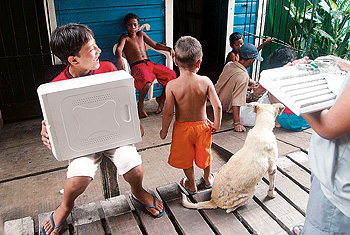
Children are among those who the CDI computer schools are equipping with the digital know-how to deal with the information society.
Baggio’s small-scale army of catalysts
Just two years after Baggio set up his first computer school, his organisation – now known as the Center for Digital Inclusion (CDI) – was running 15 schools across Brazil, and more than 5,000 students had taken its four month-long courses. It was the first time most of them had even touched a PC.
The CDI brings together Rodrigo Baggio’s twin passions – information technology and social involvement. He’d been fascinated by IT since the early 1980s, when his father gave him a computer – one of the first personal computers in the country. But from the age of twelve, he’d also worked with street children and helped out in a favela kindergarten during the school holidays, an experience that stayed with him. Thinking back to the early days of the CDI, he now recalls seeing “an opportunity to bring the two together”. Baggio believed that people in the favelas had potential that could be harnessed for more constructive purposes than drug trafficking, theft and dealing in stolen goods. But he also knew that without access to information technology, only a tiny fraction of these marginalized people would ever be able to kick-start a better life for themselves, leaving the majority condemned to continue living a bleak life in their desolate shanty-towns.
Rodrigo Baggio’s dogged pursuit of his vision has made him one of the most respected social entrepreneurs of our time. Eighteen years after it was founded, his social business, CDI, is a highly effective multinational network and one of Latin America’s leading NGOs. Within less than two decades, Baggio has created an extensive network of 780 independent local computer schools – he calls them “community centres” – right across the participating regions of Brazil and a further eight Latin American countries.
“79 percent of the world’s population has no access to the internet or other digital communications technologies. They are digitally excluded.”
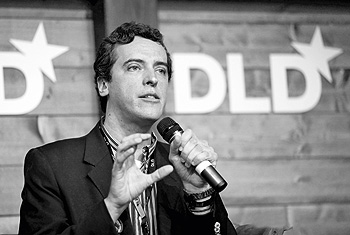
All systems go for expansion
Baggio’s concerns are as current as ever in Latin America where, even in 2013, around four in every five people are “digitally excluded”, with no access to the internet or other digital information sources. Baggio calls it “digital apartheid”: 80 percent of the population is locked out of a rapidly developing and digitally networked world, widening the existing social gulf between rich and poor, those in the centre of society and those on the margins. Baggio is putting all his energy into giving the huge mass of the “digitally excluded” access to the other world that exists beyond the confines of the slums.
From the outset, Baggio realized that the challenge he faced went way beyond simply giving underprivileged groups access to digital technology. “Just providing people with a few computers isn’t enough; what’s the point of that?” he says; “Even getting them online doesn’t change anything – at least to start with.” CDI may be underpinned by his deep conviction that “technology is an unbelievably effective catalyst for social change”, but Baggio knows also that it is ultimately just a tool, “something people can use to help them tackle specific problems”, he argues. If life is to change in communities that are rich breeding grounds for poverty and criminality, then technology needs a social dimension. It is no coincidence that Baggio likes to use the term “digital empowerment”. For him, IT isn’t about surfing the web, it’s about the very stuff of lives, something that, if used intelligently to chart a transition from “I” to “we”, can turn lone wolves into social beings. And that’s a transition that, in the best case scenario, helps people understand that their newly discovered sense of community is more sustainable, more secure and a better guarantee for the future than gang crime, violence and drug abuse.
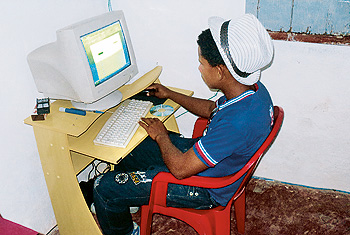
From problem to action plan
And this is exactly the approach that the CDI takes. On its four month-long courses, participants study IT but also acquire techniques for social development. As each course starts, participants identify a specific issue in the area where they are living – something that particularly disturbs them. It could be a local stream polluted with raw sewage, a problem in the local school, a campaign of terror by a local gang or sexual abuse of children. Using computers and their newly acquired IT skills, students scope the problem, access reliable information, find contacts, and share experiences with others in a similar situation. They go on to work together on drawing up an action plan for combatting the problem they’ve identified. “We don’t just sit people down in front of a screen: we encourage them to tackle issues and bring about change,” says Rodrigo Baggio, summing up CDI’s founding vision; “Our aim is to produce active and well-informed citizens who can organize and regulate their own community.”
There are many instances of tangible success. For example, a CDI course in a São Paulo settlement successfully managed to combat a plague of rats that had been a problem for years. Another, in a remote village in northern Brazil, used a photography and social media project to uncover a series of child abuse cases and to spearhead a year-long campaign to ensure that the victims of abuse and their families received local psychological and medical help.
Local “change agents” are the key to this process of techno-logical and social learning. These are individuals from the settlements who stand out in some way, perhaps by their particular commitment to a course. CDI “discovers” these individuals and equips them to become trainers themselves and run further courses. They look after the funding, organize training venues, recruit participants and carry out all the necessary negotiations with the local authorities. Without these people – who function like a kind of life-coach – most of the enthusiasm for social reform generated by the CDI courses would likely just fade away once the courses came to an end. The change agents are the people who implement Baggio’s vision of social and economic empowerment on the ground and keep it going.
Over the last few years, more than 70,000 people have completed CDI programmes, and most of them have taken away far more than just internet skills or familiarity with PowerPoint and Excel. An independent survey of participants found that CDI has helped its students to change their lives. Four out of every five said the course had given them greater insight into social conditions in the area where they lived; three quarters said their literacy had improved, while almost half – 47 percent – said they’d found a new job and 34 percent reported boosting their earning capacity. Also, an impressive 12 percent had found the confidence to set up their own business, opening a shop or workshop or providing services to local residents.
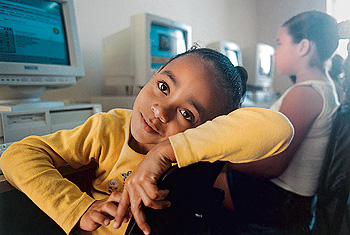
Social action, not inertia and passivity
Rodrigo Baggio has long been signalling that he wants to expand. CDI community centres are now being set up not just in poor areas but also in places like prisons and mental hospitals. He plans to export an adapted CDI model to the Middle East and North Africa, while an offshoot – the “Apps for Good” project – was introduced into British schools in 2011 and was running in 97 schools by 2012.
Boosting efficiency is at the heart of CDI’s strategy. The intention is for the community centres gradually to evolve into micro-businesses offering small-scale IT services, such as printing, computer repair, graphic design and internet access. This is Baggio’s strategy for making them less dependent on donations, and in fact, one third of them are already self-funding, with a further third “well on the way”. His long-term goal is to develop a global online learning platform to extend the reach of the CDI programme into areas where it is impossible to build a physical community centre. And of course, as the communications behaviour of IT users evolves, so too does the course content. CDI is now offering courses in the use of smartphones, tablet devices and social media, as well as “traditional” PC courses. But in the midst of all this development, it goes without saying that the social dimension of the programme remains its linchpin.
Rodrigo Baggio always intended to be in this venture for the long haul. He’s convinced that giving money to the poor isn’t enough – it changes nothing and it creates further dependency. Baggio wants to promote commitment and social action, not inertia and passivity. Ultimately, he defines himself not as a do-gooder but as the architect of sustainable social and economic change. CDI is a fundamentally entrepreneurial venture, driven by a social mission that has little to do with charity and everything to do with empowerment. Business ethics guru Karl Homann has defined the business model for a viable and sustainable social busi-ness as a game played to “a moral set of rules but with an efficient set of moves”. The wording would fit right into CDI’s founding principles.
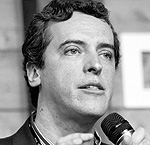
Rodrigo Baggio
Rodrigo Baggio was born in Rio de Janeiro in 1969 and from an early age, his twin passions were computers and social commitment. A degree in information technology set him up for a successful career as an entrepreneur, but in 1995, Baggio decided instead to set up his own Information Technology and Citizens Rights School, Brazil’s first computer school for the poor. This has since become the Center for Digital Inclusion (CDI), and Baggio is still its CEO. He has received numerous awards for his commitment to digital inclusion for marginalized social groups, including being named one of the “100 Global Leaders for Tomorrow” by the World Economic Forum.
PHOTOS: RJW/GETTY IMAGES / CDI / NADINE RUPP/GETTY IMAGES





